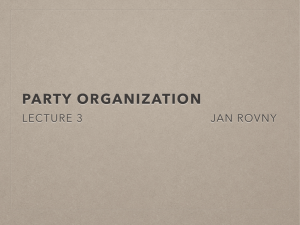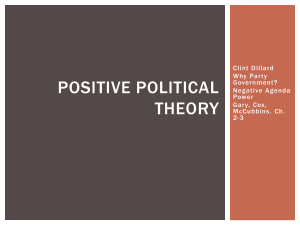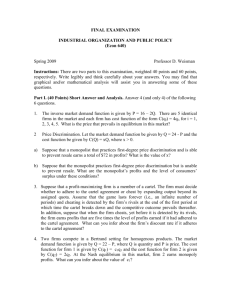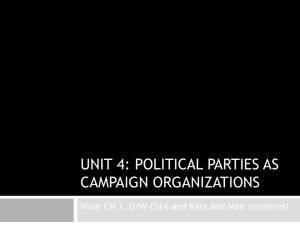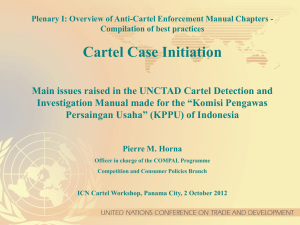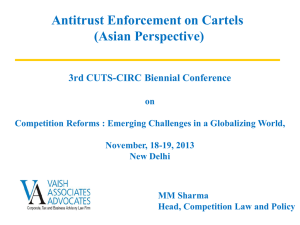I * II
advertisement
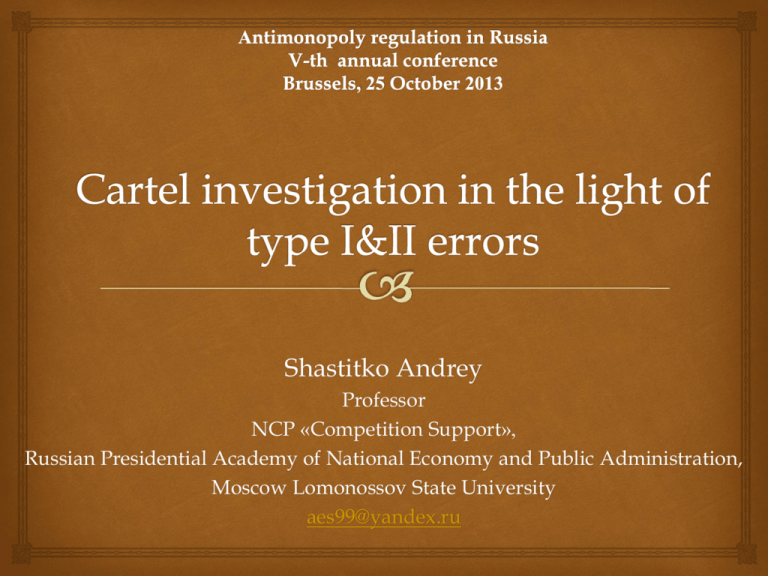
Shastitko Andrey Professor NCP «Competition Support», Russian Presidential Academy of National Economy and Public Administration, Moscow Lomonossov State University aes99@yandex.ru Issues Types I & II errors in cartel investigation Cartel economics vs. effects of the cartel Pipes case Caustic soda case Conclusions and recommendations 2 In details: Shastitko A. Cartels: incentives, organisation, deterrence policy // Russian Journal of Management, 2013, Volume 11, №3 (in Russian) 3 Types I & II errors in cartel investigation 4 Types I & II errors in cartels investigation: the concept Type I error – «false positives»: qualification of economic entities as a cartel in case of cartel absence Type II error – «false negatives»: there is cartel while qualification of the cartel is absent 5 Types I & II errors in cartels investigation: consequences Weakening deterrence effect both due to type I error and type II one (L&E literature). One probable special effect of the type I error: removal of socially efficient activity to other markets, industries or jurisdictions (L&E literature) Another one – competition restrictions (“cobra effect”) 6 Consequences of type II errors: external economics of cartel Higher prices as compared with prices under competition (ceteris paribus); Less physical exchange volumes as compared with competition conditions; Less consumers surplus; Higher seller profits as compered with competition; Deadweight losses; Innovations inhibition (dynamic aspect) in terms of cost dynamics and quality (useful goods dimensions). 7 Cartel economics vs. effects of the cartel 8 Cartel markers Price rigidity Spread formation regularities (stock market) Product standartisation Increased uniformity across firms in product prices for product, ancillary services and quality Parallel behavior Meetings (industrial associations) Caution: Cartel may express its activity in some verifiable forms. But identification of these form is not sufficient to prove the cartel presence. 9 Internal cartel economics: warning Cartel as a horizontal arrangement is not cheap talks Recognition of the economic entity in the conspiracy self-incrimination, misunderstanding of the meaning of the term, the desire to mitigate (avoid) punishment = sufficient condition for the establishment of the existence of a cartel? 10 Internal cartel economics: mechanisms Cartel is not only PROMISES of economic entities each other but also COERCION and ADAPTATION mechanisms Why COERCION? Usually, conditions for collective profit maximization are not equivalent to conditions of individual profit maximization Why ADAPTATION? Incomplete contracts and substitution of coercion for adaptation due to cartel illegality 11 Cartel agreements enforcement Coercion to abide condition of cartel agreement requires (1) diverse sanctions for violation, (2) system of monitoring to identify violation, (3) incentives to impose sanction in case of deviation discovered Adaptation mechanism under changing circumstances: (1) instruments (quotas, prices, quality standards), (2) specialized system of information disclosure based in communication Substitutability of coercion for adaptation 12 Sources of type I errors in Russian case The content of article 4 of the law on Competition Protection as regards the concept «agreement» (singular vs. composite) Standards of proof from facts findings perspective (guidelines and regime of access) Based on complaints administrative system performance with weak filter Discussion of particular issues of rules enactment and enforcement without sufficient awareness of the interplay with other ones 13 Hostility tradition in antitrust «One important result of this preoccupation with the monopoly problem is that if an economist finds something—a business practice of one sort or other—that he çloes not understand, he looks for a monopoly explanation. And as in this field we are very ignorant, the number of ununderstandable practices tends to be rather large, and the reliance on a monopoly explanation, frequent» Ronald Coase (1972) 14 Pipes case 15 «Pipes case 2011-2013»: FAS initial interpretation Relevant markets (single-joint longitudinally welded pipes, double-seam longitudinally welded pipes, or spiral-welded pipes) are concentrated. Significant entry barriers. High custom duties (15-20% as compared 5% for other products). Installed capacities exceed significantly consumption by Russian consumers Ristricted access to transport infrastructure and stripe material. Schedules of LDP delivery signed by producers and… 16 Gasprom «Pipes Case 2011-2013»: economic reconstuction Collusion under entrance? Collusion with large consumer participation? Credible commitment issues. Temporal specificity Indicative planning LDP producers’ insurance (in economic sense) under mismatching of tender procedures on the one hand, and particularities of LDP and strip material production and supply, on the other hand 17 «Pipes Case 2011-2013»: output and outcome Requalification from clause 3 part 1 article 11 law on Competition Protection to part 4 article 11 of the given law Use condition of article 13 of the law to release all LDP producers However, there are some questions to be answered… Industrial policy vs. Competition policy The large buyer role The role of «intermediator» Influence of tenders frequency and lots volumes on competition …Limits of acceptable actions and interactions 18 Caustic soda case 19 «Caustic soda 2011-…»: brief description The market of liquid caustic soda More than about economic entities Price maintaining, market division, contracting refusion (cl. 1,3, 4, part 1, art 11)? Тransport expenses (logistic schemes) Internal price vs. export price Financial result of export 20 «Caustic soda 2011-…»: important dimensions to take into account Strong complementarity of two products – caustic soda and chlorine on primary resource (brine) Products with high risk of storage and transportation (especially chlorine) Short period of chlorine storage (≤ 72 ℎ𝑜𝑢𝑟𝑠), Dramatic differences in demand for two products dynamics, Production capacities allocation as compared with consuming capacities Three technologies of production Product differentiation (horizontally and vertically). 21 Conclusions, recommendations … Do not confuse cartel effects with economics of cartels as an agreement Cartel investigation have to provide evidence in the following aspects - Cartel markers (as a condition for case opening but not sufficient proof) - Understanding of contracting in the industry - Identification of economic meaning of the agreement - Description and explanation of enforcement mechanism both on the side of coercion and adaptation 22 …and Questions When cartel case investigation is actually finished? What is appropriate to discuss while cartel case is not closed? What is real status of cartel cases in courts as regards innocence presumption? How answers on questions above do influence on cartel investigation effectiveness, in particular, and cartel deterrence, in general? 23 Thank you! www.lccp.econ.msu.ru 24
